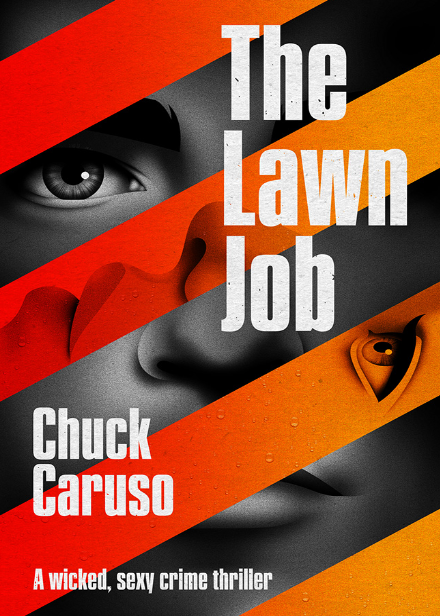The Lawn Job Book Tour – Updating The Femme Fatale
 On the book tour for Chuck Caruso’s exciting new book, ‘The Lawn Job’, Chuck talks about how he updated the role of the femme fatale for the book.
On the book tour for Chuck Caruso’s exciting new book, ‘The Lawn Job’, Chuck talks about how he updated the role of the femme fatale for the book.
The femme fatale has been a more or less constant trope in crime fiction for generations now. The phrase brings to mind the gorgeous, vamps of film noir, dangerous dames in stunning black and white cinema from the 1930’s and 40’s. These fatal women were played to great effect by the likes of Mary Astor, Lana Turner, and Rita Hayworth.
Some scholars see the archetype of the dangerous woman in ancient figures like Helen of Troy or Cleopatra, but for me the femme fatale finds her proper home only in murder stories. Crime fiction offers the milieu where she can best lure a morally questionable man to his doom. He knows better, but he’s willing to do anything to win the girl, even if part of him knows that she’s playing him.
Still, I’d argue the figure of the dangerous and willful woman goes back at least as far as Lady Macbeth whose own ambition and lust for power prompts her to push her husband to claim the throne by murdering the rightful king. She suggestively tells Macbeth, “Screw your courage to the sticking place / and we’ll not fail.†When he loses his nerve after committing the awful deed, Lady Macbeth shows that she’s the one with real backbone. She snatches away his bloody daggers and uses them to frame King Duncan’s guards for the murder. If that’s not a deadly woman in all her glory, I don’t know what is.
Fashions have changed over the years, but mystery authors and Hollywood screenwriters have periodically offered updated versions of the femme fatale. Kathleen Turner (‘Body Heat’), Linda Fiorentino (‘The Last Seduction’), Sharon Stone (‘Basic Instinct’), Sarah Michelle Geller (‘Cruel Intentions’), Rebecca Romijn-Stamos (‘Femme Fatale’), Laura Harring (‘Mulholland Drive’) and Nora Zehetner (‘Brick’) have all played delightfully devious women in excellent neo-noir films over the past few decades. Kim Basinger even sleekly reprises the traditional femme fatale in ‘L.A. Confidential’, a neo-noir film set in the 50’s and based upon James Ellroy’s nostalgic crime novel, the third book in his brilliant L.A. Quartet series.
Noir and its associated tropes have never gone completely out of style, but a few years ago, Gillian Flynn gave us an exciting new twist on the femme fatale in ‘Gone Girl’, her blockbuster novel and its film adaptation starring Rosamund Pike. Flynn’s brilliant innovation with the novel was to tell the story with multiple first-person narrators. Not only do we hear the familiar perspective of the woman’s dupe of a husband, in alternating chapters we are insidiously won over by Amy Dunne’s calm and reasoned voice as she tells the treacherous tale from her point of view. In a passage that promises to be one of the most remembered in the annals of contemporary crime fiction, the reader is both amused and appalled by Amy’s sharp insights about how a woman can win over any man by pretending to be a “cool girl.†In ‘Gone Girl’, Flynn’s meditations on the “cool girl†are profound for what they reveal about her Amy’s understanding of the male characters, but the passage is revelatory for its commentary on female manipulation of male desire.
[amazon_link id=”0995465738″ target=”_blank” ] [/amazon_link]
[/amazon_link]
Revisiting and revising the trope of the femme fatale in my own debut crime novel ‘The Lawn Job’, I decided to present the reader with not one but two dangerous women. These two dangerous women each embody a different aspect of this characteristic noir figure.
Sheila Passarelli comes off as the classic blonde bombshell, a woman who has always used her looks and her sexuality to make her way in the world, but who now, as an aging trophy wife, finds herself possessed of a deep desire for personal vengeance on those who have wronged her. In some ways, Mrs. P represents the ultimate femme fatale, descended from a long line of vamps and vixens. She’s learned all the deadly lessons of her predecessors. She draws power from the desire she provokes in the men around her while allowing them to underestimate her. Mrs. P is a modern woman, possessed of strong agency that remains concealed by her willingness to play the traditionally submissive role of wife and mother.
By contrast, my second femme fatale represents a more contemporary counterpart to Mrs. Passarelli. A transgender stripper and the sometime girlfriend of my ex-con protagonist, Juana lures readers in as surely as she seduces the men around her. Juana intrigues us because she immediately occupies a less clear space in the conventional social order. By turning away from the masculine gender identity she was born with, Juana surrenders much of the inherent cultural privilege that comes with being a man; however, as a gorgeous and sexually available femme fatale, Juana takes on the ability to turn men’s own power against them. She uses their desire for her not only as a means to undermine their self-determination but also as a way to empower herself as a woman.
Don’t get me wrong. Even though I play with these tropes in my novel, I didn’t set out to give it a heavy message. Authors stop being entertaining when they start getting up on their soapboxes. I had a great time exploring ideas about the femme fatale while writing this novel. ‘The Lawn Job’ remains first and foremost a fast-paced crime thriller. It’s a hell of a ride, and I want my readers to enjoy it.
I can’t wait to hear what you think of it!
You can buy [amazon_link id=”0995465738″ target=”_blank” ]The Lawn Job from Amazon [/amazon_link] and is available to buy from good bookshops.
Leave a Reply